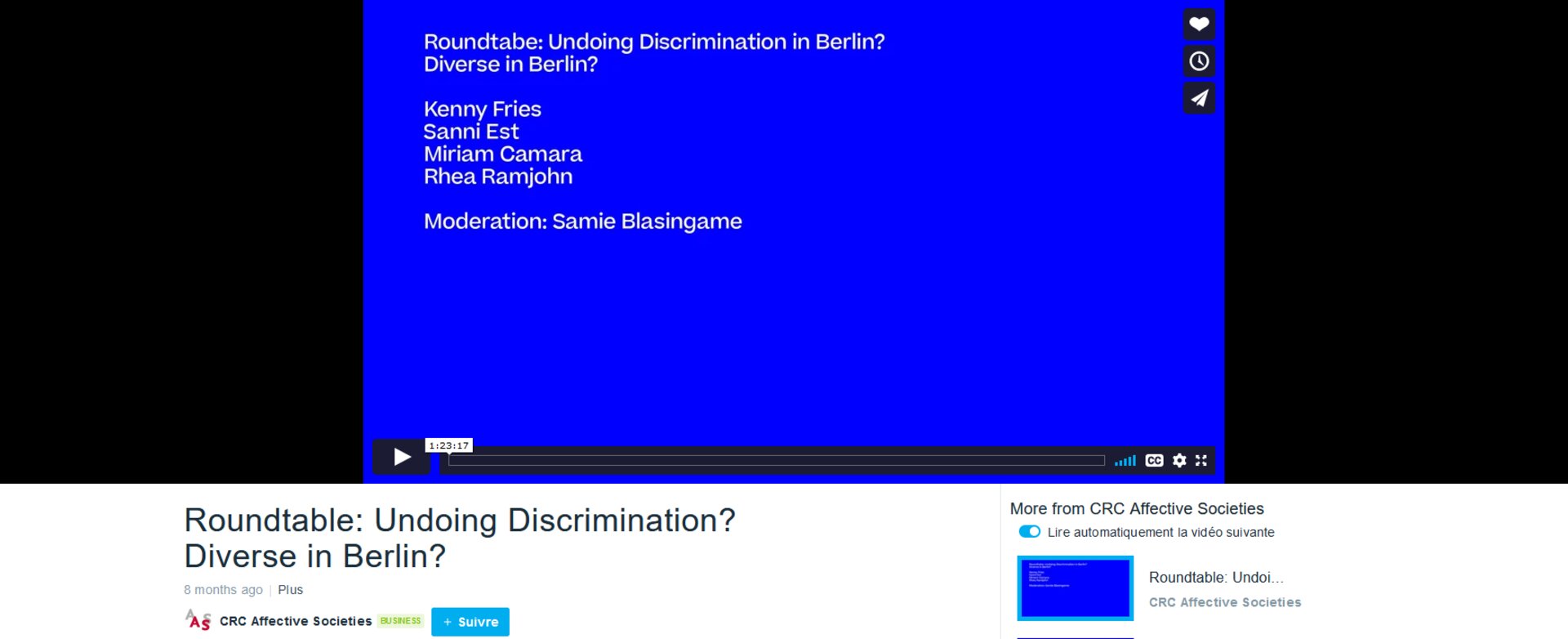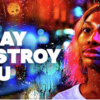This text is licensed under the Creative Commons license Attribution-NonCommercial-ShareAlike 4.0 International. The link to the original material is situated at the top right of the text.

Screenshot of the website, taken on 30.04.2022
Conference
Kenny Fries, Sanni Est, Miriam Camara, Rhea Ramjohn
Keywords: diversity, inclusion, institutional change, power structures in arts and culture, individual and collective stories
Threads: Cooperating with(in) arts and culture, (Un)framing Knowledge, Remembering
Roundtable: Undoing Discrimination? Diverse in Berlin?
Kenny Fries, Sanni Est, Miriam Camara, Rhea Ramjohn
Moderation: Samie Blasingame
2021
Keywords: diversity, inclusion, institutional change, power structures in arts and culture, individual and collective stories
Threads: Cooperating with(in) arts and culture, (Un)framing Knowledge, Remembering
Short description
“Diversity is a "must-have" in the identity of most Berlin cultural institutions. Sometimes they even invest resources for the multicolored flag that flies over them. So are diversity measures just another set of methods of solidifying what they claim to change? This panel, moderated by Samie Blasingame, puts it to the test: what does it look like in Berlin's cultural landscape? What are the inconspicuous formal routines, the small informal habits, the official and unofficial rules that create the feeling of running into a wall that one claims is not there? Are there any institutions somewhere that are undercutting the perfidious game and are there any impulses, strategies, methods, or people that are at least beginning to dismantle the supposedly non-existent walls? Are there perhaps even already best practice examples?“
Personal appreciation
This talk brings together professionals in the cultural field (artists, researchers, consultant, etc.) that share important perspectives and experiences on diversity and inclusion in cultural institutions. This discussion seems to be important for each professional who wants to work in this field to question themselves on power structures, accessibility and labels in arts and culture. The attention to questions of diversity and inclusion seems to increase in the cultural sector, but, in my opinion, brings a lot of insecurities and fragility for some (young) professionals in the field : how to deal with these issues when belonging to the privileged ? How to flip the settled power structures ?
Contribution to the "Who knows?" handbook
The talk addresses issues of representation, legitimization and tokening of art and hands-on examples on how to improve „inclusion“ practices in the field. Most importantly, these topics are brought up and discussed by people identifying to those groups they are talking about, and thus sharing subaltern knowledge while reflecting on what this means. They share personal experiences and specific needs/examples of improvements which allows the listener to concretely think about these issues.
As the SHAKIN project deals with the question on how and by whom the knowledge produced and transmitted in the cultural sector could and should be more sensitive towards invisibilised knowledge, this talks seems to introduce important experiences and suggestions : the speakers not only share this knowledge, but also deconstruct the domination structures inherent to the process.
As the SHAKIN project deals with the question on how and by whom the knowledge produced and transmitted in the cultural sector could and should be more sensitive towards invisibilised knowledge, this talks seems to introduce important experiences and suggestions : the speakers not only share this knowledge, but also deconstruct the domination structures inherent to the process.
Material(s)
Additional Information
| Location | Online Germany |
| Original language(s) | English |
| Existing translations | |
| Length | 1:23:00 |
| Project runtime | - |
| Institution of affiliation | Freie Universität Berlin, HKW, Schwules Museum |
| Sponsor(s) |
Name of contributor: Sonia Nikitin
Additional Pictures
Creative Commons
Related Contributions

Exhibition
Dialog im Dunkeln – Dialogue in the Dark
Andreas Heinecke
2000
In this exhibition, sighted people gain a better understanding of how visually impaired and blind people experience the world and visitors become aware of the limits of their own perception in everyday life, which is strongly focused on visual information.

TV Miniseries
I May Destroy You
Michaela Coel
2020
Still a rare example of art that challenges patriarchy and the violence this dominant system produces in everyday life from a Black FLINTA (and in parts queer) perspective.







